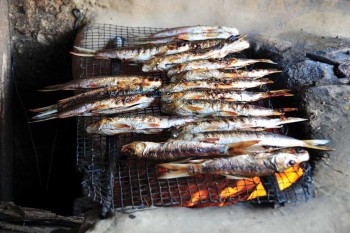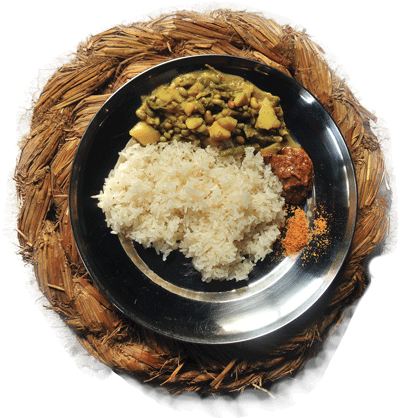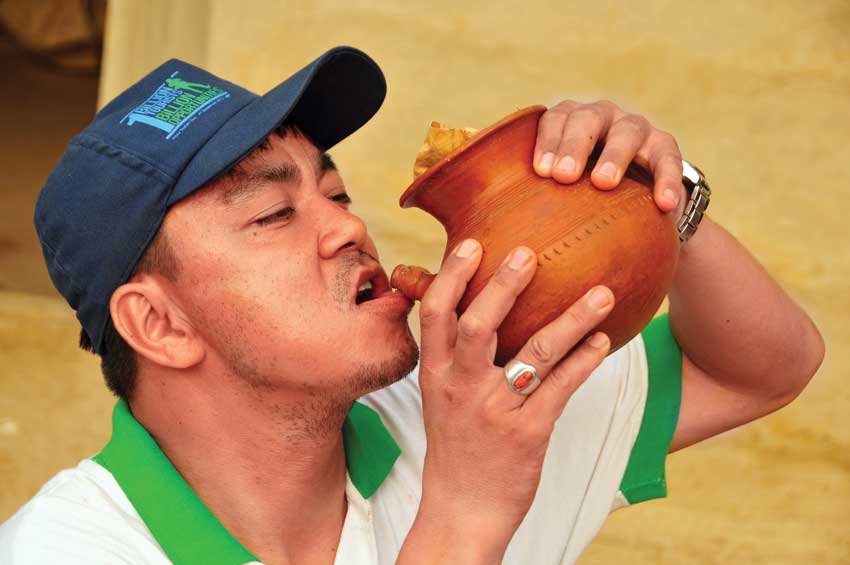The Taste of the South

The southern foothills and inner Terai of Nepal from Mechi to Mahakali are inhabited by the indigenous community of Tharu. This ethnic group has been living in forests for many years practicing farming and fishing. Their cuisine is diverse with several different subgroups distinguished by geographical boundaries, cultural features and languages.

One of the main components of their food is rice, mostly prepared from a type of sticky rice called Anadi Chamal. One of the items includes Dhikri, made from the rice flour dough molded into either elongated shapes or various forms of birds, fish and animals. It is steamed and then eaten with chutney or curry. Similarly, Bagiya is a special kind of Dhikri from Eastern Nepal with flattened shape and pointed ends, sometimes with fillings of boiled potatoes, spices and lentils. Dhikri is usually prepared during major festivals like Maghe Sankranti, Dashain and Tihar.
 Fish and crabs are also important staples of Tharu delicacies. Since most of the settlements are near rivers, fishing is one of the main livelihood activities of the community. Freshwater shrimps, crabs and smaller fishes are eaten throughout the year. Sidhara is prepared from taro stem, turmeric and dried fishes, with pungent smell and bitter taste. Ghonghi is a special gravy dish of water snail served during gatherings and get-togethers. The dish is prepared by boiling the snails like other meat dishes, with the stuffing of rice flour. Ground linseed is added as it gives consistency to the gravy and enhances the taste. It is usually served with rice. Ghonghis are prepared towards the end of monsoon.
Fish and crabs are also important staples of Tharu delicacies. Since most of the settlements are near rivers, fishing is one of the main livelihood activities of the community. Freshwater shrimps, crabs and smaller fishes are eaten throughout the year. Sidhara is prepared from taro stem, turmeric and dried fishes, with pungent smell and bitter taste. Ghonghi is a special gravy dish of water snail served during gatherings and get-togethers. The dish is prepared by boiling the snails like other meat dishes, with the stuffing of rice flour. Ground linseed is added as it gives consistency to the gravy and enhances the taste. It is usually served with rice. Ghonghis are prepared towards the end of monsoon.
Another non-vegetarian item in the Tharu diet is Pakuwa, a barbecued pork delicacy offered to deities during the religious ceremonies and festivals. On the other hand, mice is also eaten as special delicacy, eaten either grilled or as curry with gravy. The mice eaten are usually captured in the fields by farmers.
Tharu people like most of the ethnic groups of Nepal are also known for their liquor. Alcoholic beverages are prepared from fermented rice, known locally as Anadik Jhor/Jhar. The beverage is usually prepared at home.

Like its tradition and culture, Tharu cuisine is also dependent on the nature and environment the community lives in. Tharu people have lived in nature, coexisting for centuries and their food has also evolved and adapted accordingly. Their dietary items are derived from nature and what is available locally for the community.
